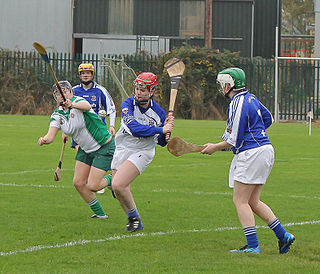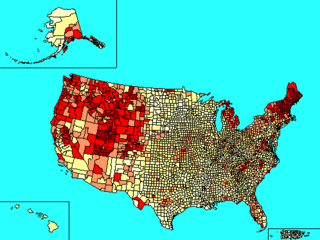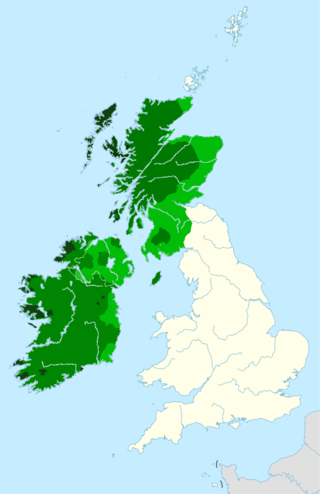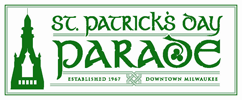
Milwaukee has a decent sized Irish-American population.

Milwaukee has a decent sized Irish-American population.
Following the Irish Famine of 1845–1849, over 2.1 million people left Ireland, many of whom sailed overseas to America, including to port cities on the Great Lakes. Thought not as popular a destination as Chicago or Cleveland, many Irish people found their way to Milwaukee. [1]
Every third weekend in August, Milwaukee Irish Fest is held on the Henry Maier Festival Park.
The Irish Cultural and Heritage Center of Wisconsin serves the Greater Milwaukee area in preserving Irish heritage and traditions as well as hosting various performing artists throughout the year. [2]
Miltown Gaels represents Milwaukee at the national level in Gaelic games. [3]

Scottish Gaelic, also known as Scots Gaelic or simply Gaelic, is a Goidelic language native to the Gaels of Scotland. As a Goidelic language, Scottish Gaelic, as well as both Irish and Manx, developed out of Old Irish. It became a distinct spoken language sometime in the 13th century in the Middle Irish period, although a common literary language was shared by the Gaels of both Ireland and Scotland until well into the 17th century. Most of modern Scotland was once Gaelic-speaking, as evidenced especially by Gaelic-language place names.

Wisconsin is a state in the Great Lakes region of the Upper Midwest of the United States. It borders Minnesota to the west, Iowa to the southwest, Illinois to the south, Lake Michigan to the east, Michigan to the northeast, and Lake Superior to the north. Wisconsin is the 25th-largest state by land area and the 20th-most populous. It is divided into 72 counties and as of the 2020 census had a population of nearly 5.9 million. Its most populous city is Milwaukee, while its capital and second-most populous city is Madison. Other large population centers include Green Bay, Kenosha, Racine, and the Fox Cities.

Milwaukee is the most populous city in the U.S. state of Wisconsin and the county seat of Milwaukee County. With a population of 577,222 at the 2020 census, Milwaukee is the 31st-most populous city in the United States, and the fifth-most populous city in the Midwest. It is the central city of the Milwaukee metropolitan area, the 40th-most populous metro area in the U.S. with 1.57 million residents.

Camogie is an Irish stick-and-ball team sport played by women. Camogie is played by 100,000 women in Ireland and worldwide, largely among Irish communities.

The Irish language was once spoken by some immigrants to the island of Newfoundland before it disappeared in the early 20th century. The language was introduced through mass immigration by Irish speakers, chiefly from counties Waterford, Tipperary and Cork. Local place names in the Irish language include Newfoundland, St. John's, Ballyhack, Cappahayden, Kilbride and St. Bride's, Duntara, Port Kirwan and Skibbereen (Scibirín). The dialect of Irish spoken in Newfoundland is said to resemble the Munster Irish of the 18th century. While the distinct local dialect is now considered extinct, the Irish language is still taught locally and the Gaelic revival organization Conradh na Gaeilge remains active in the province.

Scottish Americans or Scots Americans are Americans whose ancestry originates wholly or partly in Scotland. Scottish Americans are closely related to Scotch-Irish Americans, descendants of Ulster Scots, and communities emphasize and celebrate a common heritage. The majority of Scotch-Irish Americans originally came from Lowland Scotland and Northern England before migrating to the province of Ulster in Ireland and thence, beginning about five generations later, to North America in large numbers during the eighteenth century. The number of Scottish Americans is believed to be around 25 million, and celebrations of 'Scottishness' can be seen through Tartan Day parades, Burns Night celebrations, and Tartan Kirking ceremonies.

Canadian Gaelic or Cape Breton Gaelic, often known in Canadian English simply as Gaelic, is a collective term for the dialects of Scottish Gaelic spoken in Atlantic Canada.

The United States County Board of the Gaelic Athletic Association or USGAA, is one of the 3 county boards of the Gaelic Athletic Association (GAA) in North America, and is responsible for Gaelic games in the United States. The county board is also responsible for the United States county teams.

The Norse–Gaels were a people of mixed Gaelic and Norse ancestry and culture. They emerged in the Viking Age, when Vikings who settled in Ireland and in Scotland became Gaelicised and intermarried with Gaels. The Norse–Gaels dominated much of the Irish Sea and Scottish Sea regions from the 9th to 12th centuries. They founded the Kingdom of the Isles, the Kingdom of Dublin, the Lordship of Galloway, and briefly ruled the Kingdom of York. The most powerful Norse–Gaelic dynasty were the Uí Ímair or House of Ivar.

The Forest County Potawatomi Community is a federally recognized tribe of Potawatomi people with approximately 1,400 members as of 2010. The community is based on the Forest County Potawatomi Indian Reservation, which consists of numerous non-contiguous plots of land in southern Forest County and northern Oconto County, Wisconsin, United States. The community also administers about 7 acres (28,000 m2) of off-reservation trust land in the city of Milwaukee. According to the U.S. Census Bureau, the reservation and off-reservation trust land together have a total area of 22.72 square miles (58.8 km2). The combined population of Forest County Potawatomi Community and Off-Reservation Trust Land was 594 in the 2020 census. The nation's administrative and cultural center are located about three miles east of Crandon, Wisconsin.
The Shamrock Club of Wisconsin is the oldest and largest Irish American membership organization in the State of Wisconsin. It was founded on March 17, 1960, in Milwaukee. Currently there are chapters in Milwaukee, Fox Cities, Green Bay and Northeast Wisconsin, South Central (Baraboo), Dane County, (Madison), New London, La Crosse, and Lafayette County, (Darlington). The Rock County chapter folded in 2007.

The Clare Senior Football Championship is an annual Gaelic Athletic Association club competition organised by Clare GAA between the top twelve gaelic football clubs in County Clare, Ireland. The winners represent the county in the Munster Senior Club Football Championship, the winners of which progress to the semi-finals of the All-Ireland Senior Club Football Championship. The Clare SFC final is generally held in the month of October and is played at Cusack Park in Ennis.

Scottish Canadians are people of Scottish descent or heritage living in Canada. As the third-largest ethnic group in Canada and amongst the first Europeans to settle in the country, Scottish people have made a large impact on Canadian culture since colonial times. According to the 2016 Census of Canada, the number of Canadians claiming full or partial Scottish descent is 4,799,010, or 13.93% of the nation's total population. Prince Edward Island has the highest population of Scottish descendants at 41%.

The Gaels are an ethnolinguistic group native to Ireland, Scotland and the Isle of Man. They are associated with the Gaelic languages: a branch of the Celtic languages comprising Irish, Manx and Scottish Gaelic.
The Acting Irish International Theatre Festival (AIITF) is an annual festival of full-length Irish plays performed by Irish community theater companies from Canada, US and Ireland. The festival was started in 1994 and is performed in a different city each year.
The Irish language originated in Ireland and has historically been the dominant language of the Irish people. They took it with them to a number of other countries, and in Scotland and the Isle of Man it gave rise to Scottish Gaelic and Manx, respectively.

The Scottish people or Scots are an ethnic group and nation native to Scotland. Historically, they emerged in the early Middle Ages from an amalgamation of two Celtic peoples, the Picts and Gaels, who founded the Kingdom of Scotland in the 9th century. In the following two centuries, Celtic-speaking Cumbrians of Strathclyde and Germanic-speaking Angles of Northumbria became part of Scotland. In the High Middle Ages, during the 12th-century Davidian Revolution, small numbers of Norman nobles migrated to the Lowlands. In the 13th century, the Norse-Gaels of the Western Isles became part of Scotland, followed by the Norse of the Northern Isles in the 15th century.
The Hurling Club of Madison is an American amateur sports club based in Madison, Wisconsin, playing and promoting the sport of hurling. Since 2015, the club has also sponsored a Gaelic football team, adding a women's Gaelic football team in 2016. The club is a member of the United States Gaelic Athletic Association, Heartland Division.

Milwaukee Saint Patrick's Day Parade takes place each year in downtown Milwaukee the Saturday prior to Saint Patrick's Day. It is sponsored by the Shamrock Club of Wisconsin. In March, 2024, the Shamrock Club will be producing its 546h Annual parade.